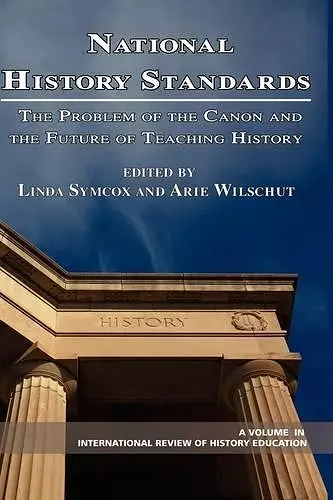National History Standards
The Problem of the Canon and the Future of History Teaching
Peter Lee editor Stuart J Foster editor Linda Symcox editor Arie Wilschut editor Rosalyn Ashby editor
Format:Hardback
Publisher:Information Age Publishing
Published:4th Mar '09
Currently unavailable, and unfortunately no date known when it will be back

A volume in International Review of History Education Series Editor Peter Lee, Rosalyn Ashby, Stuart Foster As educators in the United States and Europe develop national history standards for K-12 students, the question of what to do with national history canons is a subject of growing concern. Should national canons still be the foundation for the teaching of history? Do national canons develop citizenship or should they be modified to accommodate the new realities of globalization? Or should they even be discarded outright? These questions become blurred by the debates over preserving national heritages, by so-called 'history wars' or 'culture wars,' and by debates over which pedagogical frameworks to use. These canon and pedagogical debates often overlap, creating even more confusion. A misconceived ""skills vs. content"" debate often results. Teaching students to think chronologically and historically is not the same as teaching a national heritage or a cosmopolitan outlook. But what exactly is the difference? Policy-makers and opinion leaders often confuse the pedagogical desirability of using a 'framework' for studying history with their own efforts to reaffirm the centrality of national identity rooted in a vision of their nation's history as a way of inculcating citizenship and patriotism. These are the issues discussed in this volume."" Today's students are citizens of the world and must be taught to think in global, supranational terms. At the same time, the traditionalists have a point when they argue that the ideal of the nation-state is the cultural glue that has traditionally held society together, and that social cohesion depends on creating and inculcating a common national culture in the schools. From an educational perspective, the problem is how to teach chronological thinking at all. How are we to reconcile the social, political and intellectual realities of a globalizing world with the continuing need for individuals to function locally as citizens of a nation-state, who share a common past, a common culture, and a common political destiny? Is it a duty of history education to create a frame of reference, and if so, what kind of frame of reference should this be? How does frame-of-reference knowledge relate to canonical knowledge and the body of knowledge of history as a whole?
Nothing can better serve the promotion of a deeply humanistic but analytic history in precollegiate classrooms than discourse among an internationally diverse body of reform-minded history educators. This books delivers just that. The essays in National History Standards: The Problem of the Canon and the Future of Teaching History, by leading history educators on both sides of the Atlantic, offer cogent critiques of the tangled reform efforts on how history should be taught in the schools as well as sophisticated models for constructing both national and trans-national history for the young people who will determine the course of twenty-first- century human affairs. Gary B. Nash, Director, National Center for History in the Schools, UCLA
ISBN: 9781593116699
Dimensions: unknown
Weight: 628g
332 pages